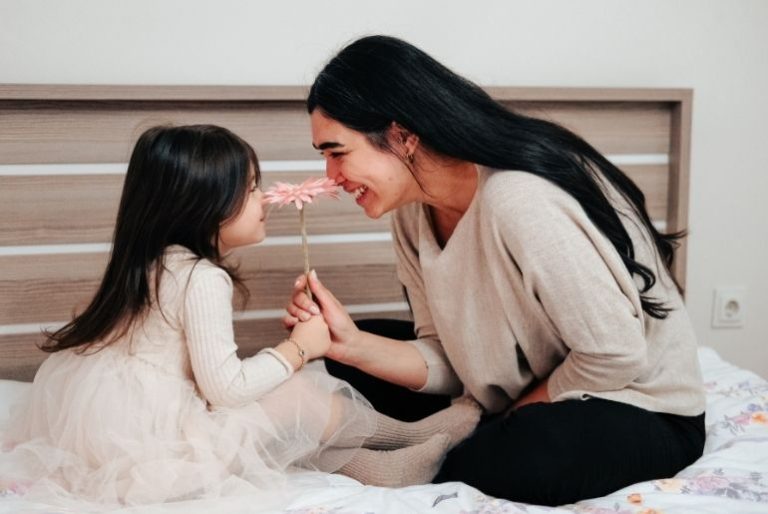I often get questions about helping children through their parents’ separation and I recently received this question: Even when the parents are on the same page and are happier not living together, how do I get my kids through it? It breaks my heart. Tough for everyone!
Separation is no fun for the adults or the children, but there are certain steps that you can take to make things as easy as possible on everyone.
Structure and timetable
While it is very good that you are on the same page, it is really important that the arrangements are simple enough and clear enough that your children can explain them to anyone (theoretically) who asks. .
Make sure that each child has a timetable on their wall in each house. Children do better with a structure clear enough to be written down and simple enough that even the seven-year-old can tell someone else what the arrangements are. That way they know exactly what is happening and they can see that the timetable was put together with the agreement of both parents.
They need to know exactly what time of day they are transferring from one household to another, what gear will live in which house and who is doing the pick-up and drop-off.
Keep out of each other’s house
I understand that it might seem lovely to have one parent come into the other’s house, have meals together, be tucked in by “the other” parent – but there are huge potential pitfalls with this sort of arrangement. Children often live in hope that their parents will get back together again. Popping in and out of each other’s house only keeps this hope alive in your children.
Another good reason to have the doorstep as the boundary is that you have chosen to live separate lives. Sooner or later, one parent is likely to feel “invaded” if the other strolls around what has become their house – even if it was previously the family home.
If you need to meet to discuss matters pertaining to the separation or to your children, arrange to meet on neutral territory. It also means that should the meeting become heated and voices get raised, your children do not need the anxiety and unpleasantness of witnessing it.
Stakeholders
Children need a stake in each household. At the very least they need a bed of their own and a place to keep their belongings. Where possible, they should have their own toy and book collection in each house, so they can look forward to being reunited with some favourite playthings when they arrive at the each house.
It depends on the arrangement you have as to whether their clothes go with them of they have a clothes collection in each home. Do your absolute best to clean the clothes that come into the house and send them back in an excellent and wearable state. This maintains harmony between households and avoids a child returning with dirty laundry having to watch a parent get exasperated.
Nearness is good
One of the best things that you could do for your children is to have two households near enough to their school(s) so that their activities and friendships do not need to be disrupted.
If you do live near, try not to drive past the other’s house. Take a different route. Even if you are merely going the shortest way, the other parent is bound to feel spied upon. It is also very uncomfortable for a child who loves you dearly to have to see you drive past.
Think carefully before babysitting for each other
While there is simplicity and safety in baby-sitting for each other, it means knowing more that is necessary about each other’s lives and what each of you are up to. It is far better to have your own babysitting arrangements so that you avoid going in and out of each other’s houses and being left “alone” in one another’s homes.
Get double school notices
Be sure to insist that their classes, schools and places of extra-curricular activities send out double notices and reports so that regardless of where the children are, each parent knows about and can talk with the children about what is going on in their lives when they are not under your roof.
Unless something is going on at school that requires “the power of two”, you are better off going to Parent/Teacher meetings separately. Rather than playing “happy families”, it is better that each of you develops your own relationship with teachers and coaches.
Sports and other activities
Try to avoid your children having to choose between parents. Even knowing which parent to look at first or run over to can be stressful for children. Try to have a system whereby you alternate at activities.
At the “one-offs” like concerts, both of you should be there if possible. Keep friendly and make your children’s lives uncomplicated.
How much time?
While current Family Law thinking favours 50:50 time in each household, I far favour being equally concerned about their welfare without children having to live like nomads and change beds several times in a fortnight. These are adult decisions not child decisions, but it is reasonable to allow children of the age yours are to have input.
If you are able to make arrangements without Courts or Lawyers, let you children know that you will live with the first arrangement for twelve weeks and then there will be a review so that they can have input into what is working for them and what needs to change. After that, six-monthly reviews gives good stability.
Dating and re-partnering
Think slowly and carefully before introducing other adults ( and their children) into your children’s lives. They have enough to deal with living in two households and having to greet and farewell parents on a regular basis.
If you have several days a fortnight without your children, that is the time to meet up with new adults. There should not be any rush. Your children’s stability is more important.
Listening
Give your children a chance to tell you how visitng the other houwe is for them. They may well come home needing to let off steam. Your priority is to listen with empathy and to stay on their side so that they get the feeling that “Mum gets it”.
Avoid taking action. Unless there are health and safety issues, support your child to endure some of the discomforts of two households, probably with different rules. Your job is to promote resilience to tolerate mild discomfort through knowing you can some home and let off steam to Mum.
See the good on the situation
Bruno Bettelheim once said, “Every child needs at least one parent who is irrationally crazy about them (and then they will be OK”)
This is a chance for your children to have two parents who are irrationally crazy about them without your having to manage a less than happy relationship under one roof.
Do your best to enjoy the adult advantages of separation.
Good luck,
Diane






Just a thought on having separate interviews at school. I am a teacher and I thoroughly dislike have to verbally report twice on the same child. Unless there is a very good reason that you must not be together (abuse etc) for the 10 minutes or so that the interviews last, can’t parents be civil enough to sit through a P/T conference together? You are not there to be playing ‘happy families’, you are attending a formal, professional meeting about the development of your child. If this was a medical issue, would you expect the specialist doctor to do the… Read more »